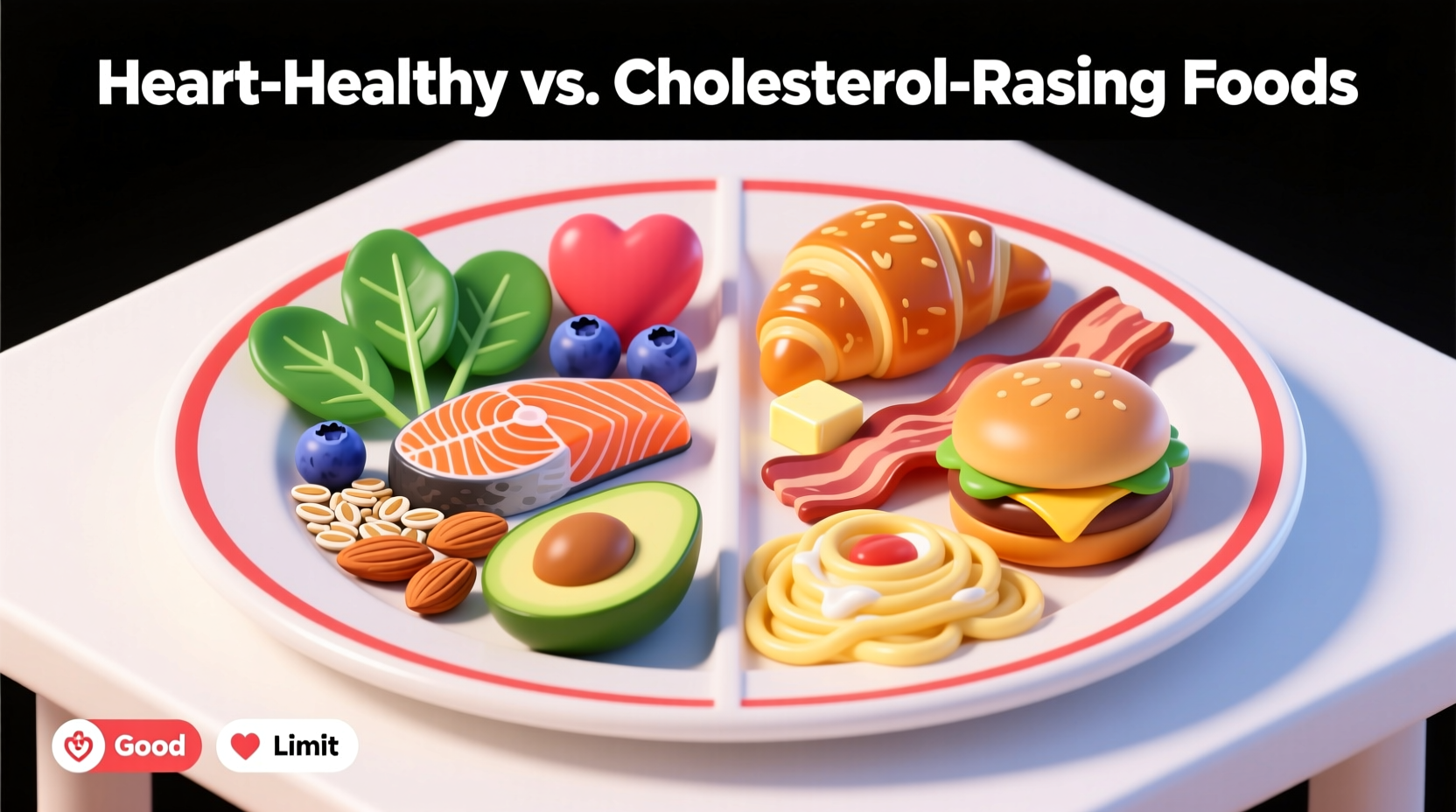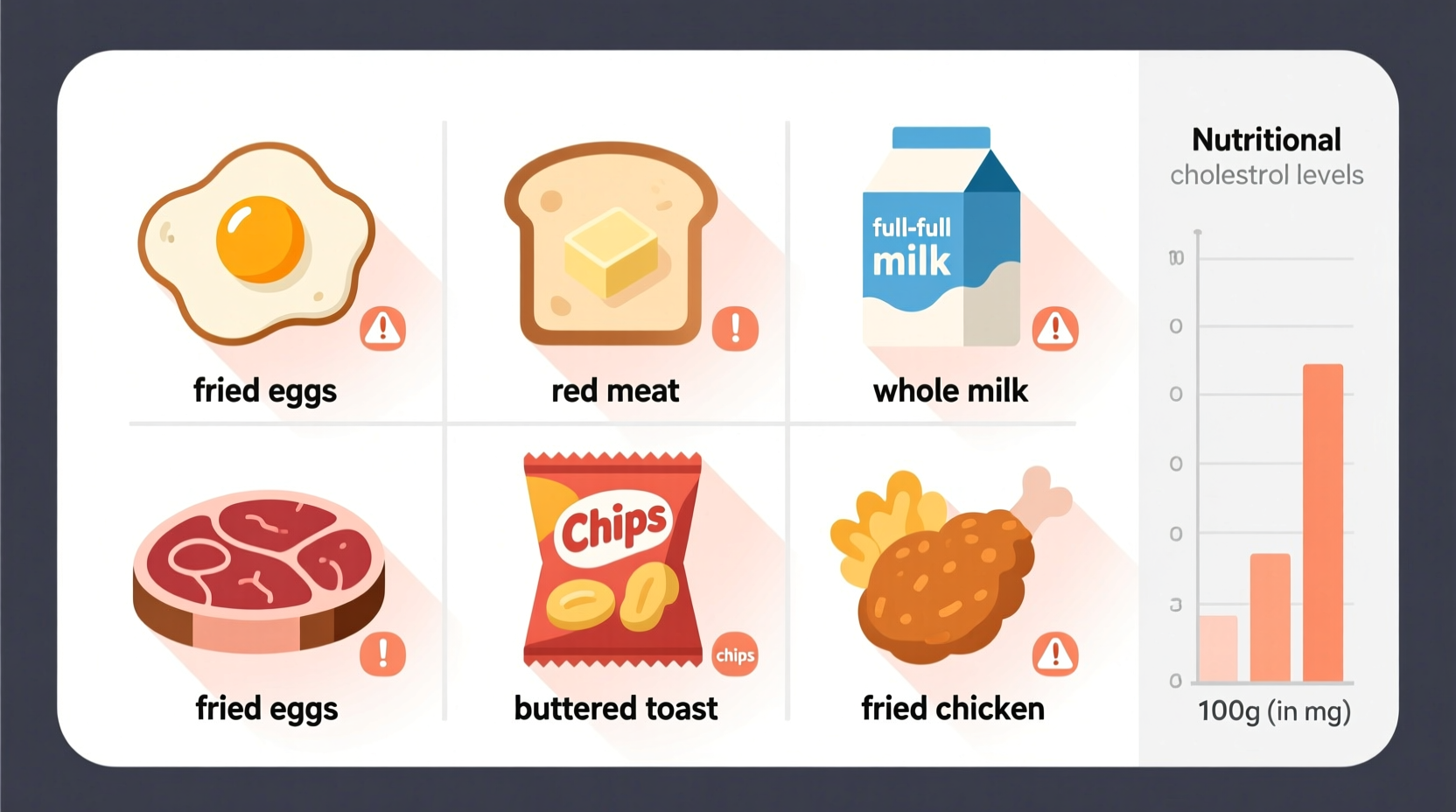Understanding Cholesterol: Beyond the Basics
Cholesterol often gets labeled as "bad," but your body actually needs it for vital functions like building cells and producing hormones. The real concern comes when LDL ("bad") cholesterol builds up in your arteries, potentially leading to heart disease. While your liver produces all the cholesterol your body needs, certain foods can push levels into unhealthy territory.
"Many people don't realize that dietary cholesterol itself—like that found in eggs—has less impact on blood cholesterol than saturated and trans fats," explains Antonio Rodriguez, culinary expert with expertise in food chemistry. "The fats we consume play a much larger role in determining our cholesterol profile." 
The Top Cholesterol-Raising Foods You Should Limit
Not all fats affect cholesterol equally. Here's what research shows about the most problematic dietary components:
Saturated Fats: The Primary Culprit
Saturated fats have the strongest connection to increased LDL cholesterol. The American Heart Association recommends limiting saturated fats to less than 6% of daily calories. Common sources include:
- Fatty cuts of red meat (beef, lamb, pork)
- Processed meats (sausages, hot dogs, bacon)
- Full-fat dairy products (whole milk, cheese, butter)
- Tropical oils (coconut oil, palm oil)
- Baked goods made with these ingredients
Trans Fats: The Most Dangerous Type
Partially hydrogenated oils (the main source of artificial trans fats) significantly increase LDL while decreasing HDL ("good") cholesterol. Though banned in many countries, they may still appear in:
- Fried foods (especially from fast food restaurants)
- Some margarines and shortenings
- Commercially baked goods (cookies, cakes, pastries)
- Non-dairy creamers
Dietary Cholesterol: Less Impact Than You Might Think
For most people, dietary cholesterol (found in animal products) has a smaller effect on blood cholesterol than saturated and trans fats. However, some individuals are more sensitive. Sources include:
- Egg yolks (the whites are cholesterol-free)
- Organ meats (liver, kidney)
- Shellfish (shrimp, lobster)
| Food Category | Cholesterol Impact | Recommended Limit |
|---|---|---|
| Processed meats | High (saturated fat + sodium) | Minimize completely |
| Fried foods | Very high (trans + saturated fats) | Occasional only |
| Full-fat dairy | Moderate to high | Limit to 1-2 servings daily |
| Egg yolks | Low to moderate for most people | Up to 1 whole egg daily for healthy adults |
Context Matters: When Foods May Be Less Problematic
Not everyone responds to cholesterol-raising foods the same way. Several factors influence how your body processes dietary fats:
- Genetic predisposition: Some people have genetic variations that make them more sensitive to dietary cholesterol
- Overall dietary pattern: Eating cholesterol-raising foods as part of a balanced diet with plenty of fruits, vegetables, and whole grains reduces their impact
- Physical activity level: Regular exercise can improve how your body processes fats
- Existing health conditions: People with diabetes or existing heart disease may need stricter limits
The National Institutes of Health notes that "for about 70% of the population, dietary cholesterol has little to no effect on blood cholesterol levels." However, the remaining 30%—known as hyper-responders—may need to be more cautious with both saturated fats and dietary cholesterol.
Smart Swaps for Heart-Healthy Eating
You don't have to eliminate flavor to protect your heart. Try these practical substitutions that maintain taste while supporting better cholesterol levels:
Instead of Saturated Fats, Choose:
- Avocado or avocado oil instead of butter
- Olive oil instead of coconut oil in cooking
- Lean cuts of meat (sirloin, tenderloin) instead of fatty cuts
- Low-fat or non-dairy alternatives for milk and yogurt
Instead of Processed Foods, Choose:
- Baked or grilled items instead of fried foods
- Homemade versions of favorite dishes to control ingredients
- Whole food snacks like nuts and fruit instead of packaged cookies
Putting It All Together: A Practical Approach
Managing cholesterol through diet isn't about strict deprivation—it's about making informed choices that fit your lifestyle. The Harvard T.H. Chan School of Public Health emphasizes that "the overall dietary pattern matters more than any single food or nutrient" when it comes to heart health.
Start by gradually incorporating these changes:
- Read nutrition labels specifically for saturated and trans fat content
- Cook more meals at home where you control the ingredients
- Incorporate more plant-based meals that naturally contain no cholesterol
- Focus on adding heart-healthy foods rather than just eliminating "bad" ones
Remember that small, sustainable changes create lasting results. As Antonio Rodriguez notes, "The goal isn't perfection—it's progress. Replacing one cholesterol-raising food with a healthier option each week creates meaningful change over time."
Do eggs really raise cholesterol levels?
For most people, moderate egg consumption (up to one whole egg daily) doesn't significantly raise cholesterol levels. The saturated fat often eaten with eggs (like bacon or butter) has a greater impact. However, if you have diabetes or existing heart disease, consult your healthcare provider about appropriate limits.
Is coconut oil healthy despite being high in saturated fat?
Despite popular claims, coconut oil is approximately 90% saturated fat and raises LDL cholesterol similar to butter. The American Heart Association recommends limiting coconut oil and choosing unsaturated fats like olive or canola oil for heart health.
How quickly can dietary changes lower cholesterol?
Significant dietary changes can lower LDL cholesterol by 5-10% within 4-6 weeks. More substantial reductions typically require 3-6 months of consistent healthy eating combined with other lifestyle factors like regular exercise.
Are all saturated fats equally bad for cholesterol?
Research suggests that not all saturated fats affect cholesterol equally. For example, stearic acid (found in dark chocolate) has less impact on LDL than palmitic acid (found in palm oil and animal fats). However, current dietary guidelines recommend limiting all saturated fats for optimal heart health.











 浙公网安备
33010002000092号
浙公网安备
33010002000092号 浙B2-20120091-4
浙B2-20120091-4